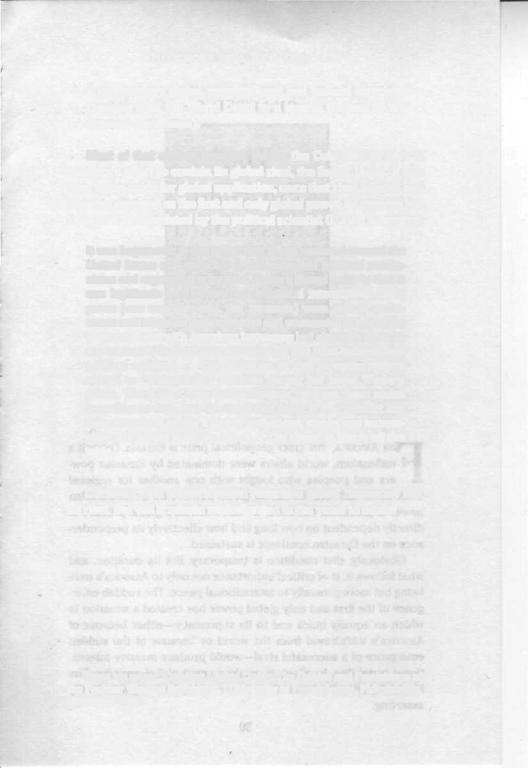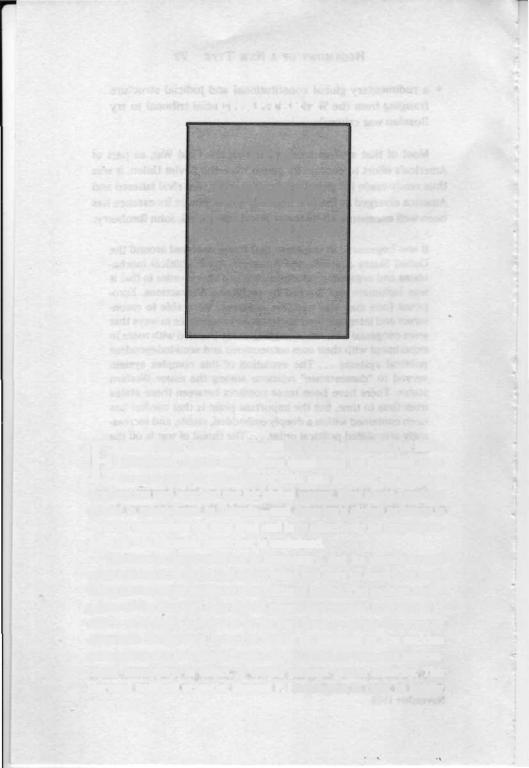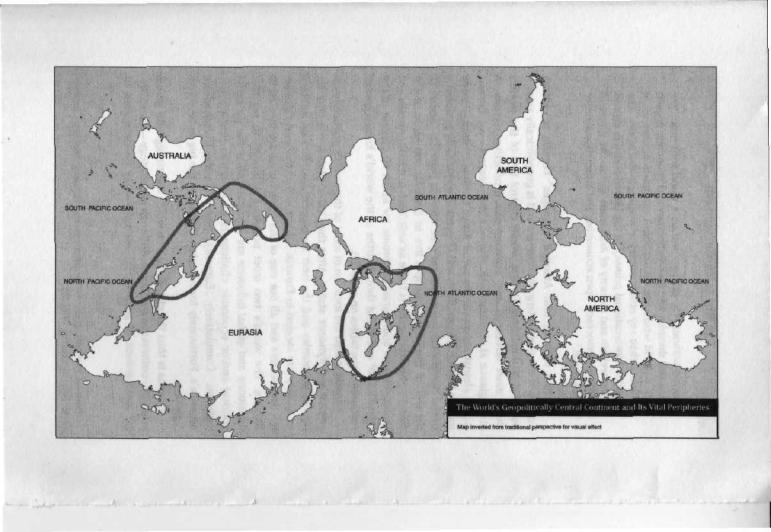
Grand_Chessboard
.pdf
HEGEMONY OF A NEW TYPE 23
In contrast, the scope and pervasiveness of American global power today are unique. Not only does the United States control all of the world's oceans and seas, but it has developed an assertive military capability for amphibious shore control that enables it to project its power inland in politically significant ways. Its military legions are firmly perched on the western and eastern extremities of Eurasia, and they also control the Persian Gulf. American vassals and tributaries, some yearning to be embraced by even more formal ties to Washington, dot the entire Eurasian continent, as the map on page 22 shows-
America's economic dynamism provides the necessary precondition tor the exercise of global primacy. Initially, immediately after World War II, America's economy stood apart from all others, accounting alone for more than 50 percent of the world's GNP. The economic recovery of Western Europe and Japan, followed by the wider phenomenon of Asia's economic dynamism, meant that the American share of global GNP eventually had to shrink from the disproportionately high levels of the immediate postwar era. Nonetheless, by the time the subsequent Cold War had ended, America's share of global GNP, and more specifically its share of the world's manufacturing output, had stabilized at about 30 percent, a level that had been the norm for most of this century, apart from those exceptional years immediately after World War II.
More important, America has maintained and has even widened its lead in exploiting the latest scientific breakthroughs for military purposes, thereby creating a technologically peerless military establishment, the only one with effective global reach. All the while, it has maintained its strong competitive advantage in the economically decisive information technologies. American mastery in the cutting-edge sectors of tomorrow's economy suggests that American technological domination is not likely to be undone soon, especially given that in the economically decisive fields, Americans are maintaining or even widening their advantage in productivity over their Western European and Japanese rivals.
To be sure, Russia and China are powers that resent this American hegemony. In early 1996, they jointly stated as much in the course of a visit to Beijing by Russia's President Boris Yeltsin. Moreover, they possess nuclear arsenals that could threaten vital U.S. interests. But the brutal fact is that for the time being, and for

24 THE GRAND CHESSBOARD
some time to come, although they can initiate a suicidal nuclear war, neither one of them can win it. Lacking the ability to project forces over long distances in order to impose their political will and being technologically much more backward than America, they do not have the means to exercise—nor soon attain—sus- tained political clout worldwide.
In brief, America stands supreme in the four decisive domains of global power, militarily, it has an unmatched global reach; economically, it remains the main locomotive of global growth, even if challenged in some aspects by Japan" and Germany (neither of which enjoys the other attributes of global might); technologically, it retains the overall lead in the cutting-edge areas of innovation; and culturally, despite some crassness, it enjoys an appeal that is unrivaled, especially among the world's youth—all of which gives the United States a political clout that no other state comes close to matching. It is the combination ofall four that makes America the onlycomprehensiveglobalsuperpower.
THE AMERICAN GLOBAL SYSTEM
Although America's international preeminence unavoidably evokes similarities to earlier imperial systems, the differences are more essential. They go beyond the question of territorial scope. American global power is exercised through a global system of distinctively American design that mirrors the domestic American experience. Central to that domestic experience is the pluralistic character of both the American society and its political system.
The earlier empires were built by aristocratic political elites and were in most cases ruled by essentially authoritarian or absolutist regimes. The bulk of the populations of the imperial states were either politically indifferent or, in more recent times, infected by imperialist emotions and symbols. The quest for national glory, "the white man's burden," "la mission civilisatrlce," not to speak of the opportunities for personal profit—all served to mobilize support for imperial adventures and to sustain essentially hierarchical imperial power pyramids.
The attitude of the American public toward the external projection of American power has been much more ambivalent. The pub-

HEGEMONY OF A NEW TYPE 25
lie supported America's engagement in World War II largely because of the shock effect of the Japanese attack on Pearl Harbor. The engagement of the United States in the Cold War was initially endorsed more reluctantly, until the Berlin blockade and the subsequent Korean War. After the Cold War had ended, the emergence of the United States as the single global power did not evoke much public gloating but rather elicited an inclination toward a more limited definition of American responsibilities abroad. Public opinion polls conducted in 1995 and 1996 indicated a general public preference for "sharing" global power with others, rather than for its monopolistic exercise.
Because of these domestic factors, the American global system emphasizes the technique of co-optation (as in the case of defeated rivals—Germany, Japan, and lately even Russia) to a much greater extent than the earlier imperial systems did. It likewise relies heavily on the indirect exercise of influence on dependent foreign elites, while drawing much benefit from the appeal of its democratic principles and institutions. All of the foregoing are reinforced by the massive but intangible impact of the American domination of global communications, popular entertainment, and mass culture and by the potentially very tangible clout of America's technological edge and global military reach.
Cultural domination has been an underappreciated facet of American global power. Whatever one may think of its aesthetic values, America's mass culture exercises a magnetic appeal, especially on the world's youth. Its attraction may be derived from the hedonistic quality of the lifestyle it projects, but its global appeal is undeniable. American television programs and films account for about three-fourths of the global market. American popular music is equally dominant, while American fads, eating habits, and even clothing are increasingly imitated worldwide. The language of the Internet is English, and an overwhelming proportion of the global computer chatter also originates from America, influencing the content of global conversation. Lastly, America has become a Mecca for those seeking advanced education, with approximately half a million foreign students flocking to the United States, with many of the ablest never returning home. Graduates from American universities are to be found in almost every Cabinet on every continent.

26 THE GRAND CHESSBOARD
The style of many foreign democratic politicians also increasingly emulates the American. Not only did John F. Kennedy find eager imitators abroad, but even more recent (and less glorified) American political leaders have become the object of careful study and political imitation. Politicians from cultures as disparate as the Japanese and the British (for example, the Japanese prime minister of the mid-1990s, Ryutaro Hashimoto, and the British prime minister, Tony Blair—and note the "Tony," imitative of "Jimmy" Carter, "Bill" Clinton, or "Bob" Dole) find it perfectly appropriate to copy Bill Clinton's homey mannerisms, populist common touch, and public relations techniques.
Democratic ideals, associated with the American political tradition, further reinforce what some perceive as America's "cultural imperialism." In the age of the most massive spread of the democratic form of government, the American political experience tends to serve as a standard for emulation. The spreading emphasis worldwide on the centrality of a written constitution and on the supremacy of law over political expediency, no matter how short-changed in practice, has drawn upon the strength of American constitutionalism. In recent times, the adoption by the former Communist countries of civilian supremacy over the military (especially as a precondition for NATO membership) has also been very heavily influenced by the U.S. system of civilmilitary relations.
The appeal and impact of the democratic American political system has also been accompanied by the growing attraction of the American entrepreneurial economic model, which stresses global free trade and uninhibited competition. As the Western welfare state, including its German emphasis on "codetermination" between entrepreneurs and trade unions, begins to lose its economic momentum, more Europeans are voicing the opinion that the more competitive and even ruthless American economic culture has to be emulated if Europe is not to fall further behind. Even in Japan, greater individualism in economic behavior is becoming recognized as a necessary concomitant of economic success.
The American emphasis on political democracy and economic development thus combines to convey a simple ideological message that appeals to many: the quest for individual success enhances freedom while generating wealth. The resulting blend of

HEGEMONY OF A NEW TYPE 27
idealism and egoism is a potent combination. Individual self-fulfill- ment is said to be a God-given right that at the same time can benefit others by setting an example and by generating wealth. It is a doctrine that attracts the energetic, the ambitious, and the highly competitive.
As the imitation of American ways gradually pervades the world, it creates a more congenial setting for the exercise of the indirect and seemingly consensual American hegemony. And as in the case of the domestic American system, that hegemony involves a complex structure of interlocking institutions and procedures, designed to generate consensus and obscure asymmetries in power and influence. American global supremacy is thus buttressed by an elaborate system of alliances and coalitions that literally span the globe.
The Atlantic alliance, epitomized institutionally by NATO, links the most productive and influential states of Europe to America, making the United States a key participant even in intra-European affairs. The bilateral political and military ties with Japan bind the most powerful Asian economy to the United States, with Japan remaining (at least for the time being) essentially an American protectorate. America also participates in such nascent trans-Pacific multilateral organizations as the Asia-Pacific Economic Cooperation Forum (APEC), making itself a key participant in that region's affairs. The Western Hemisphere is generally shielded from outside influences, enabling America to play the central role in existing hemispheric multilateral organizations. Special security arrangements in the Persian Gulf, especially after the brief punitive mission in 1991 against Iraq, have made that economically vital region into an American military preserve. Even the former Soviet space is permeated by various American-sponsored arrangements for closer cooperation with NATO, such as the Partnership for Peace.
In addition, one must consider as part of the American system the global web of specialized organizations, especially the "international" financial institutions. The International Monetary Fund (IMF) and the World Bank can be said to represent "global" interests, and their constituency may be construed as the world. In reality, however, they are heavily American dominated and their origins are traceable to American initiative, particularly the Bretton Woods Conference of 1944.

28 THE GRAND CHESSBOARD
Unlike earlier empires, this vast and complex global system is not a hierarchical pyramid. Rather, America stands at the center of an interlocking universe, one in which power is exercised through continuous bargaining, dialogue, diffusion, and quest for formal consensus, even though that power originates ultimately from a single source, namely, Washington, D.C. And that is where the power game has to be played, and played according to America's domestic rules. Perhaps the highest compliment that the world pays to the centrality of the democratic process in American global hegemony is the degree to which foreign countries are themselves drawn into the domestic American political bargaining. To the extent that they can, foreign governments strive to mobilize those Americans with whom they share a special ethnic or religious identity. Most foreign governments also employ American lobbyists to advance their case, especially in Congress, in addition to approximately one thousand special foreign interest groups registered as active in America's capital. American ethnic communities also strive to influence U.S. foreign policy, with the Jewish, Greek, and Armenian lobbies standing out as the most effectively organized.
American supremacy has thus produced a new international order that not only replicates but institutionalizes abroad many of the features of the American system itself. Its basic features include
•a collective security system, including integrated command and forces (NATO, the U.S.-Japan Security Treaty, and so forth);
•regional economic cooperation (APEC, NAFTA [North American Free Trade Agreement]) and specialized global cooperative institutions (the World Bank, IMF, WTO [World Trade Organization]);
" procedures that emphasize consensual decision making, even if dominated by the United States;
•a preference for democratic membership within key alliances;

HEGEMONY OF A NEW TYPE 29
•a rudimentary global constitutional and judicial structure (ranging from the World Court to a special tribunal to try Bosnian war crimes).
Most of that system emerged during the Cold War, as part of America's effort to contain its global rival, the Soviet Union. It was thus ready-made for global application, once that rival faltered and America emerged as the first and only global power. Its essence has been well encapsulated by the political scientist G. John Ikenberry:
It was hegemonic in the sense that it was centered around the United States and reflected American-styled political mechanisms and organizing principles. It was a liberal order in that it was legitimate and marked by reciprocal interactions. Europeans [one may also add, the Japanese] were able to reconstruct and integrate their societies and economies in ways that were congenial with American hegemony but also with room to experiment with their own autonomous and semi-independent political systems ... The evolution of this complex system served to "domesticate" relations among the major Western states. There have been tense conflicts between these states from time to time, but the important point is that conflict has been contained within a deeply embedded, stable, and increasingly articulated political order.... The threat of war is off the table.2
Currently, this unprecedented American global hegemony has no rival. But will it remain unchallenged in the years to come?
2From his paper "Creating Liberal Order: The Origins and Persistence of the Postwar Western Settlement," University of Pennsylvania, Philadelphia, November 1995.

CHAPTER 2
The
Eurasian
Chessboard
FOR AMERICA, THE CHIEF geopolitical prize is Eurasia. For half a millennium, world affairs were dominated by Eurasian powers and peoples who fought with one another for regional
domination and reached out for global power. Now a non-Eurasian power is preeminent in Eurasia—and America's global primacy is directly dependent on how long and how effectively its preponderance on the Eurasian continent is sustained.
Obviously, that condition is temporary. But its duration, and what follows it, is of critical importance not only to America's wellbeing but more generally to international peace. The sudden emergence of the first and only global power has created a situation in which an equally quick end to its supremacy—either because of America's withdrawal from the world or because of the sudden emergence of a successful rival—would produce massive international instability. In effect, it would prompt global anarchy. The Harvard political scientist Samuel P. Huntington is right in boldly asserting:
30

THE EURASIAN CHESSBOARD 31
A world without U.S. primacy will be a world with more violence and disorder and less democracy and economic growth than a world where the United States continues to have more influence than any other country in shaping global affairs. The sustained international primacy of the United States is central to the welfare and security of Americans and to the future of freedom, democracy, open economies, and international order in the world.1
In that context, how America "manages" Eurasia is critical. Eurasia is the globe's largest continent and is geopolitically axial. A power that dominates Eurasia would control two of the world's three most advanced and economically productive regions. A mere glance at the map also suggests that control over Eurasia would almost automatically entail Africa's subordination, rendering the Western Hemisphere and Oceania geopolitically peripheral to the world's central continent (see map on page 32). About 75 percent of the world's people live in Eurasia, and most of the world's physical wealth is there as well, both in its enterprises and underneath its soil. Eurasia accounts for about 60 percent of the world's GNP and about three-fourths of the world's known energy resources (see tables on page 33).
Eurasia is also the location of most of the world's politically assertive and dynamic states. After the United States, the next six largest economies and the next six biggest spenders on military weaponry are located in Eurasia. All but one of the world's overt nuclear powers and all but one of the covert ones are located in Eurasia. The world's two most populous aspirants to regional hegemony and global influence are Eurasian. All of the potential political and/or economic challengers to American primacy are Eurasian. Cumulatively, Eurasia's power vastly overshadows America's. Fortunately for America, Eurasia is too big to be politically one.
Eurasia is thus the chessboard on which the struggle for global primacy continues to be played. Although geostrategy—the strategic management of geopolitical interests—may be compared to
'Samuel P. Huntington. "Why International Primacy Matters," InternationalSecurity(Spring1993):83.

